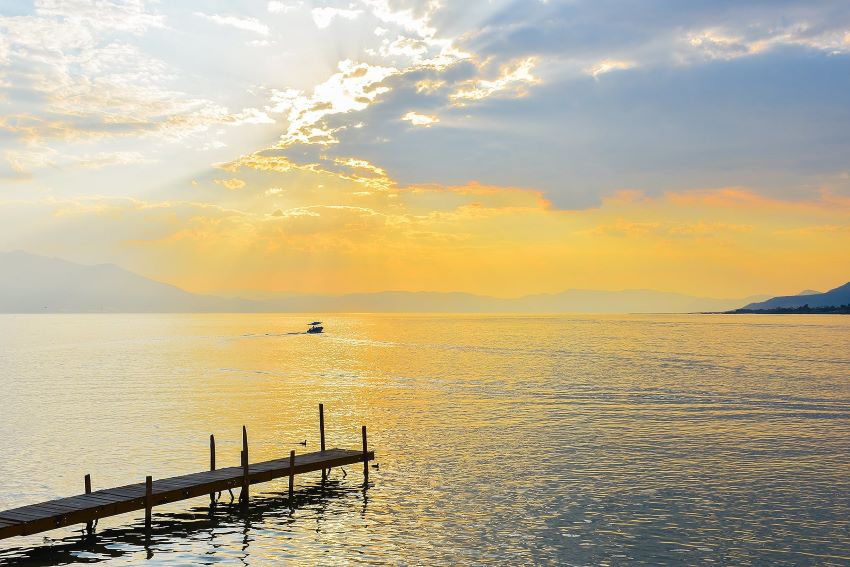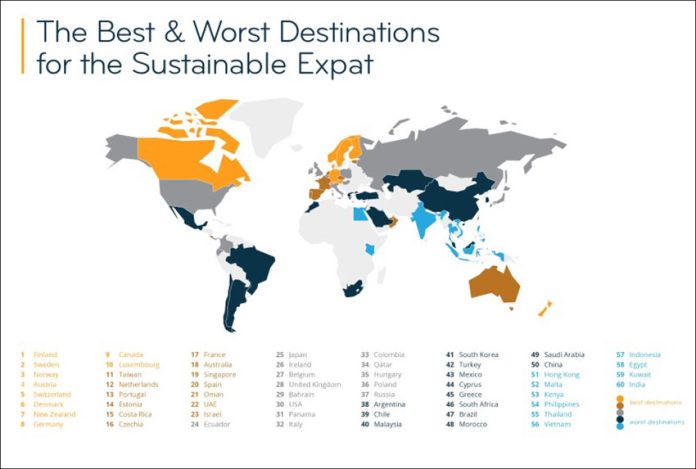Counting yourself as one of the estimated 9 million U.S. passport holders living overseas, it is enlightening to take note from time to time about how your new home stacks up against the rest of the world.
Expats take pride in our chosen places of residence; it is part of a compare/contrast mindset that put us living abroad in the first place. So, when the expat think-tank organization Internations.org published data from their 2020 Expat Insider survey in October, I dove excitedly into its Environment & Sustainability Ranking findings.
The ranking asks respondents to rate 60 countries in areas such as sustainable goods and services, energy supplies, recycling and waste management, green policies, environmental awareness, the natural environment and air and water quality. The 15,000 expats who participated live in 181 countries and represent 173 nationalities.
I immediately looked for an easy-to-digest infographic or map showing my adopted country’s status. It did not take long to find Mexico, painted in black and next door to a gray U.S. and orange Canada. Most of Central and South America was similarly oscuro.
It will not surprise many expats and those interested in living overseas that Nordic nations and Western Europe dominate the ranking’s upper shelf; Asia falls to the lower levels. And Mexico? The news is not great. Mexico comes in at a very disappointing 43rd out of 60 nations, the worst-ranking country out of the North American destinations featured in the report. This puts Mexico eons behind Sweden, Finland and Austria, though ahead of India, Egypt and Indonesia. Tiny Costa Rica ranks best in the Western Hemisphere.

Mexico manages to stay out of the top 10 (and bottom 10) in all subcategories, should this be any consolation. However, it does get one notably low mark: 51st place (out of 60) for none other than water quality and treatment.
For someone who lives along the shore of Mexico’s largest lake, Chapala, this is not a big surprise. Lake Chapala’s health rises and falls with whatever happens upriver in the México state, Guanajuato and Michoacán. The effluent from industry, agriculture and ranching is often debilitating to the lake’s health, mirroring a general apathy toward water issues across Mexican society.
In the green products and utilities ranking, in which respondents shared their satisfaction with the availability of green goods and services like renewable energy, organic food, sustainable products, clean energy, and waste management and recycling efforts, the contrast between top-ranked Sweden (thanks to progressive taxation) and last-place India (failing hard in waste management and recycling) could not be starker.
And Mexico? With a ranking of 43, do not expect much good news. Almost half, 47% of respondents, rank Mexico’s waste management and recycling negatively. Of course, the waste management debacle belies what happens at the pueblo level of Mexican society. In this stratum, nothing is wasted, thrown away or discarded haphazardly without ensuring the article has no remaining value; even then, little of material heft is discarded by Mexicans in the lower economic stratum.
If the global mantra be “reduce, reuse, recycle,” then Mexico’s nonurban dwellers are beholden to the first two but utterly helpless when it comes to the last. Only 35% of Mexico expats are happy with the waste management and recycling efforts, as opposed to overall 60% globally.
In Mexico, just 32% of expats say the local population is interested in environmental issues, and only 31% say the government in Mexico supports policies to protect the environment, versus 55% globally. It is, of course, important to remember that these statistics are subjective, based on respondents’ awareness. There is no doubt some ignorance about successful, grassroots environmental advances in Mexico that have not reached English-only readers.
Readers of this fine online newspaper may cringe reading about the Mexican government’s shortcomings and private-sector abuses related to the natural world.
In the policies and people subcategory of the survey, the Nordics are believed to take the environment most seriously. Egypt, Kuwait and India round out the bottom dwellers. Mexico stays out of the bottom 10, no doubt thanks to a generation of ecologically aware urban activists who continue to push for progress. There is a positive vote for Mexico’s youth and expat-led farmers’ markets and organic food producers, as 61% of Mexico’s migrants are happy with the availability of green goods and services.
In the quality of environment subcategory of the survey, Mexico came in 45th, but there is a mixed bag of findings: 85% of expats in Mexico rate the natural environment positively, as opposed to 82% globally. I believe that is because we live in an adopted nation labeled by naturalists as “mega-diverse.” Our natural surroundings are a constant source of awe and inspiration to us, giving Mexico a head start over whatever the Nordic and European leaders can claim.
Some readers may react to these findings about Mexico with a certain “love it or leave it” mindset. If we expats are cast as invaders from abroad, then why not just pick up and invade somewhere else like, say, Costa Rica?
I prefer to take the report’s benchmarking for what it is, while helping my Mexican neighbors understand the road ahead may be potholed but navigable. And what a road it is.
Greg Custer is as a permanent resident of Ajijic, Jalisco. He operates the online community www.choosingmexico.com.
